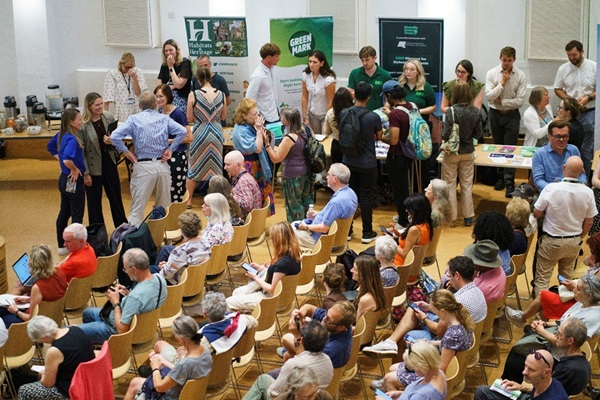The future of climate and nature in Richmond is a call for collective action
Date:
22 July 2025
Author:
Councillor Julia Neden-Watts
Title:
Joint Deputy Leader and Chair of the Environment, Sustainability, Culture and Sports Services Committee

Recent patterns of extreme heat alternating with heavy rainfall give a tangible indication of how climate change will affect the borough and tackling the adverse impacts of climate change will require coordinated action across the borough.
Last week, we held a special edition of the Richmond Sustainability Forum at Duke Street Church in Richmond to mark the launch of the Richmond Climate and Nature Strategy. The strategy, which sits alongside the Climate Action Plan, outlines how we will tackle a changing climate over the next five years and is a pathway to reach our vision of a carbon neutral council by 2030 and a net zero borough by 2043.
This is not only a vision but a plan of action for how we can work together to become resilient to flooding and extreme heat, reduce energy and water consumption, improve air quality, reduce waste, promote greener transport options, and support nature to recover and thrive.
Thank you to all the residents, local organisations, council services and panel members who joined us for the event.
Rachel Purdon, Head of Sustainability at the Royal Botanic Gardens at Kew, spoke about their new Carbon Garden, where visitors can explore the carbon cycle. Rachel described how climate change and species extinction are linked and some of the many ways that plant and fungal life can contribute to repair and resilience.
Andrew Hagger, Head of Climate Change and Sustainability at Richmond Council, took us through the Richmond Climate & Nature Strategy and the five key priority areas where we can make the biggest difference.
These include:
- Cutting emissions from buildings
- Supporting greener travel and reducing air pollution
- Protecting and restoring nature and green spaces
- Moving to a zero-waste, circular economy
- Helping communities prepare for climate risks


The panel included:
- Marguerite Murdoch a local architect
- Tim Lennon from London Cycling Campaign
- Rachel Purdon from Royal Botanic Gardens, Kew
- Simon Westgarth from Richmond Furniture Scheme
- Myszka Gużkowska from Barnes Common and Community BlueScapes
The panel was chaired by Jon Evans, Assistant Chief Executive of Richmond Council.
From our panellists we heard about impactful actions to tackle some of the challenges we’re facing such as 140 tonnes of furniture being collected in the past year, transport infrastructure changes such as school streets for lower emissions and quieter neighbourhoods, and the approach to flood resilience and climate adaptation through improving our water bodies and natural surroundings with the DEFRA funded Community BlueScapes partnership with Barnes Common and WWT.
Audience members raised questions about trees, heat pumps, and energy efficiency. The challenges of navigating complex processes and the need for access to clear and reliable information about retrofit were acknowledged. Questions were also asked about where the funding will come from, what finance options might be available, and how communities can make the transition to greener energy.
The council has a crucial role in facilitating climate action, providing clear and reliable information to those seeking to reduce emissions from their properties, and supporting opportunities for green jobs and local skills development.
We are committed to having a joined-up approach within the council. Delivering projects effectively requires coordination across planning, finance, employment & skills, and communications teams.
In Richmond upon Thames, we're fortunate to have networks of knowledgeable, enthusiastic residents, community organisations, and local businesses, all keen to do their part and we have a Council that is determined to make rapid progress towards the strategy's goals.
There is no denying the challenging road that is ahead of us, but with this framework of coordinated action, we will achieve a greener, healthier, more resilient Richmond - where people and nature can flourish together.


More information
For more information and news:
- Read the Climate and Nature Strategy (2025 to 2030) and Climate Action Plan
- Download the Residents Action Pack
- Stay up to date on climate news by subscribing to our Climate Change newsletter

Share this
Up to: Council blog 2025
Updated: 22 July 2025
